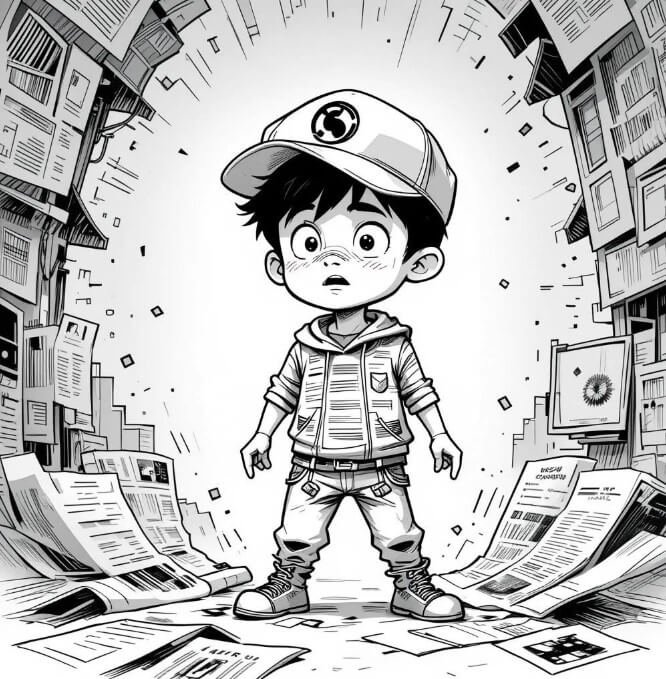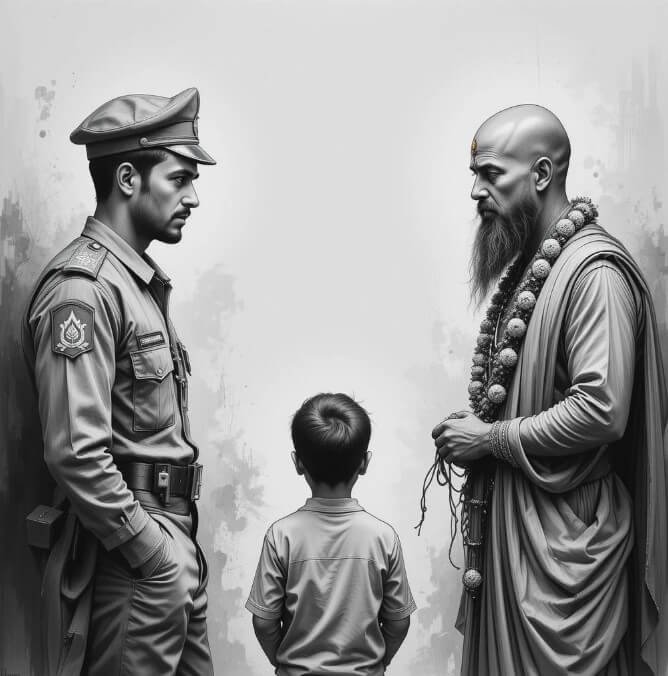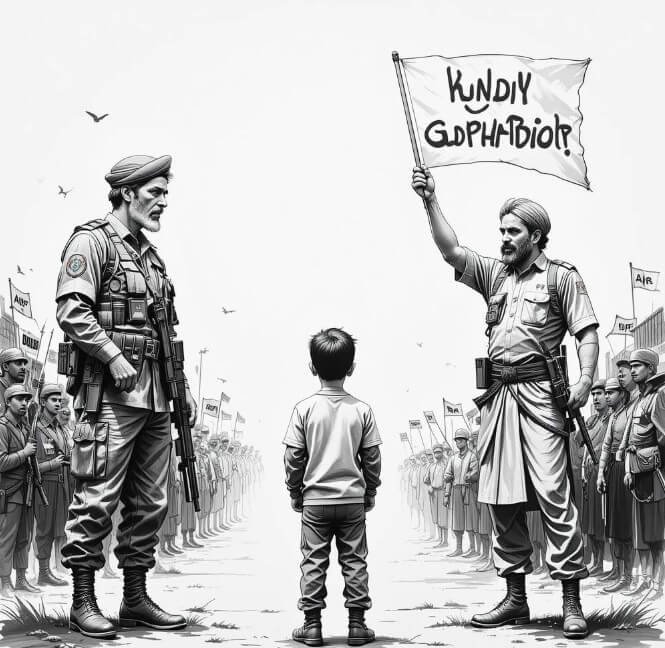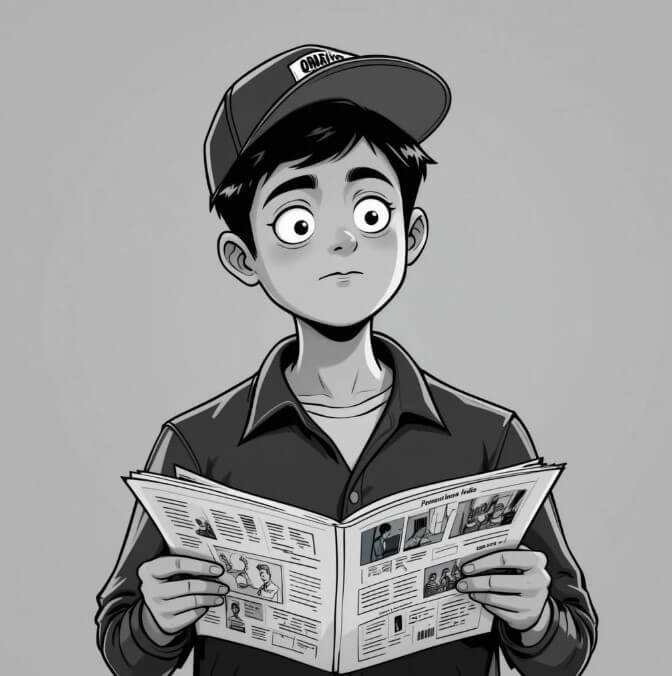The two eyes looked at the different corners of the world
There was a guy in the labor camp of Dubai whose eyes looked at different corners of the world at the same time. But he was looking at a specific rectangle shape inside the lottery machine in the evening. He was surrounded by four people today. The rock stars who win 2500 dirhams always have this fan base for one week, as usual.
It was a six-digit draw. One has to match five numbers to get 2500 dirhams. On the night of the day before yesterday, the guy with the two corner eyes was checking the daily draw results. He counted his matches slowly. One. Two. Haa, three. Fooooou. His eyes went inside his eyeballs suddenly and came back, like the head of a tortoise. “Paanch.” He paused his heart for one minute to check the next number.
Because a full match winner gets 100,000 dirhams, people used to joke about this draw, saying, \”If one matches all the patterns, he can go home the next day.\” It sounded like they’d be free from the jail they were in. Anyway, the differently focused eyes, at night, while the last count literally came into correct order for the first time in the history, to see whether the last number matched or not.
The next morning, every lottery enthusiast in the camp saw his photo. He was a rock star who won 2500 dirhams with a five-number match. But those two differently focused eyes were depressed and cried because of being just one number away from lakhs.

Anyway, he accepted the temporary rockstar vibe in the camp by wearing a new leather jacket throughout the week. He bought drinks for his friends. The Ibn Battuta shop put his photo on the lottery advertisement board.
Watching this man\’s happiness that day, Einstein realized his joy wasn’t coming from money but from the attention he got from his colleagues and other camp members. Einstein never liked being surveilled. His owner had installed a camera and monitored employees constantly, even hearing the sounds they made. One day, the owner complimented Einstein for singing well. So Einstein stopped singing when he was alone inside the shop.
Like Einstein, the security guards, cleaners, restaurant waiters—everyone in the labor camp hated surveillance. The cameras observing them made them do more work, and the little breaks they took were reported to their owners. The management used these observations to scold them or as points against them when they asked for a salary increment.
But in a broader sense—contrarily—everybody in the camps liked being observed. They craved attention. They wanted people to see what they preferred to show from their lives.
Older guys in the camp boasted about their stories to newcomers.
The lovers explained their adventures in the new country to their partners over the phone.
Friends shared their sorrows with one another.
Though people wanted to be alone in the wrong rooms, they didn’t actually like being lonely. They sought attention in different ways, like how the lottery helped those two differently focused eyes.
Even though they lived in labor camps—industrial jails—Einstein felt a bit peaceful in those regions. He was no longer influenced by news agencies from far away. Which didn’t make him their spokesperson anymore without paying him. Without letting him check whether it is really relevant to the actual life he is in. In the old days, on the beaches, he was the spokesperson of his mother. He’d repeat all the stories she told their neighbors and pass them off as his own.


One day, a big thing happened. He was listening to his mother’s friend, a woman crying and cursing her drunken husband who beat her daily. That evening, Einstein narrated the whole story to the drunken uncle. Young Einstein was searching for a perfect audience for his storytelling and found an actual listener.

The story made an impact suddenly. The kids searched for Einstein at his home. His father asked why.
“Papa is beating Mama. He’s calling Einstein,” the kids replied.
Why?
To prove his point for beating the woman more.
Einstein’s father beat him like an Indian policeman beating a criminal in a movie. Einstein cried a lot. He didn’t know what crime he’d committed but was afraid to face the woman again in his lifetime. One day, he saw her while going to the local shop to buy sugar. He froze in fear. She called him “Kundani” , where are you escaping?\’
“Kundani” means someone who or the action which transfers harmful information to the powerful, causing the vulnerable to suffer, in the coastal language of Kerala.
When Einstein became a young journalist after years, he saw that many big journalists, politicians, and billionaires in his country were essentially doing \’Kundani \’ all their lives to earn money. But his father had beaten him for it. So he never did it again, afraid of repeating the act.

His noisy journalism career was what made Einstein feel peaceful inside the labor camps. Here, he helped illiterate people get jobs, apply for health insurance, listen to them while they shared their sorrows with management, and checked on the healing of their recent wounds. He wasn’t distracted by women, didn’t cheat, and didn’t develop ego or anger with humans.
When he was a journalist for companies, he merely gave orders for Beaurocracy and governments to do these things. But now, he was actually doing the work himself.
An old Nepali grandpa hesitant to ask for his resume to look better felt confident when Einstein came.
One day an young Pakistani applying for a security job explained his details in Hindi and wanted his documents prepared. Before sharing one more detail with Einstein he looked at the man beside him, wearing a saffron bindi—signifying a right-wing supporter in India—watched the scene. After the pause the Pakistani youth told his two years experience in the Pakistan Army. He was a little uncomfortable in an indian shop now. The bindi guy\’s eyes screamed silently at Einstein, while he didn\’t hesitate and adding those details; \”You…Traitor…my country India… bharat mata ki jai.\”
Einstein told the charge for the document service was 15 dirhams. So the bindi guy’s expression turned more pitying: \”Even for 15 dirhams, you betray India?\”
But when Einstein charged him 3 dirhams for his printing work, the bindi guy softened. “Bhayya, thoda adjust karo—mera paas 2 and a half dirhams only.”
Einstein gave him a discount. Thus, the bindi guy came to an agreement in his mind that to forgive Einstein’s “treason.” For half a dirham, he closed his eyes on this biggest crime ever ; that Einstein made a resume and documents which will help a Pakistani guy who escaped from the Army, get a Security job in Dubai.

Einstein thought about it. Why do people hate soldiers from neighboring countries? Because cinema and the media portray them as symbols of danger. Videos of the opposite country’s army being killed are celebrated. But when their soldiers are martyred, they curse and develop anger with the neighboring country citizens.

Einstein saw this as a dangerous game. It’s played to create common enemies, allowing politicians to manipulate people. That’s why the bindi man didn’t see a boy escaping the dangerous game, looking for a new life. He only saw a murderer—an enemy—in someone he didn’t even spend at least five minutes with.

The two corner eyes man suddenly came to the shop ; \’hei bhayya kya hale?\’ (What\’s up brother? in hindi)
Einstein greeted him back and noticed that his two eyes were watching equally the ex-Pakistan army man and the saffron bindi man standing at his two sides. Perhaps the world needs more humans with these two-cornered eyes.
(To be continued…)


Pingback: Einstein in Dubai (Chapter -9) – Kaviruu